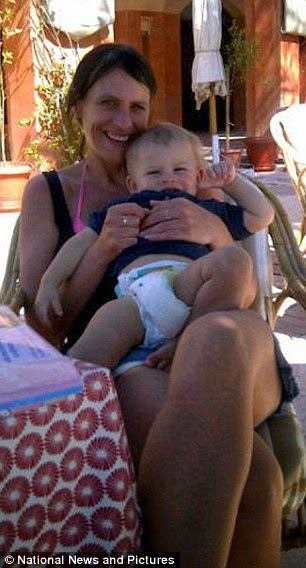Donna Oettinger and her baby Zaki died on a train track after the mother was told she couldn't getpsychiatric help, an inquest has heard
Cradling her three-year-old son, Donna Oettinger, 41, lay down in front of a train after being told
by her psychiatrist 'I can't help you', an inquest has heard.
Oettinger had been
denied urgent psychiatric help in the months before she and her son Zaki died
on train tracks in south London in March 2013, it was claimed.
Just three months before her death, she took an overdose
while visiting a friend in Yorkshire and was 'disappointed' to have survived,
the inquest was told.
A care worker treating the accounts assistant from
Croydon in south London then told her family she needed 'urgent' home care on
her discharge.
Despite being promised this by mental health bosses, Ms
Oettinger was then told the home team could not provide psychiatric help, the
inquest heard.
An inquest into the two deaths at Croydon Coroner's Court
today heard her mother Carol Oettinger describe the family's battle to secure
the right therapy for her daughter.
She told the inquest her daughter went alone to visit
friend Frances Felt in Yorkshire to 'work on her anxiety' in December 2012 but
took an overdose.
A day later she was seen by Paul Willison, a social
worker in Rotherham, who recommended that she received 'intensive home
therapy'.
After agreeing to receive treatment and telling doctors
she recognised the consequences of her behaviour, she was then deemed 'not
treatable'.
In a statement given to the inquest Mr Willison said he
contacted health workers in Croydon with his concerns and said: '[They] said
there was a home treatment team that covered Donna's locality.'
However her mother told the court that on her daughter's
return to London, a psychiatric nurse said this was not the case.
Mrs Oettinger told the inquest: 'We said Donna had just
come out of intensive care, Paul Willison had faxed his concerns through saying
she needed urgent treatment. She said 'we didn't do urgent treatment here.'
In desperation
the family turned to her psychiatrist, Dr Hemanth Rao, but Mrs Oettinger added:
'Donna said she was unhappy to have survived her suicide attempt.
'I said to Dr
Rao about Mr Willison's report... she was recommended home treatments, there
was nothing in actual fact. Dr Rao said he couldn't help us.'
Trainee
psychologist Dr Hermanth Rao, said: 'Potentially any patient can benefit from
home treatment.
'I don't really
know how the home treatment team (HTT) works in Rotherham, there is a
suggestion that there is some psychological treatment that they could give.
'However in
Tamworth Road in London the HTT is not experienced in providing psychiatric
therapy.
'In Rotherham
they said the HTT is necessary because of the skills of the team, but the same
may not be same in London.
'I also suspect
that the HTT threshold in Rotherham might be much lower than in London.'
Dr Rao said that
a faxed note from Rotherham social worker Paul Willison had not been 'uploaded'
to computer systems.
In a statement
the social worker told the inquest that he had advised Ms Oettinger was given
home treatment and checked that it would be available in Croydon.
After seeing Ms
Oettinger on return from Yorkshire Dr Rao advised that she was assigned a 'care
coordinator' to be provided through the South London and Maudsley NHS
Foundation Trust.
However a
miscommunication meant that the intended nurse, Elizabeth Oduntan, was not
informed, the inquest heard.
Ms Oettinger was
seen by the nurse for an assessment on December 17, just days after her failed
suicide bid.
She admitted to
Coroner that she had not checked the notes faxed by the Rotherham team.
She said: 'It's
not something I would usually do, but I can't remember why I didn't contact
Rotherham.'
When asked if
she agreed she should have she replied 'yes, if I had the time.'
Instead the
nurse said it was a 'duty crisis' and her only objective was to make sure her
patient was on the right medication.
'The immediate
problem presented to me was how is she doing to be safe,' she told the inquest.
The coroner
highlighted that without contacting the doctors who treated her for her
overdose she wouldn't have been able to give the correct advice, to which the
nurse agreed.
Shaheen Rahman,
representing Ms Oettinger's family, said the nurse had done 'the very minimum'
considering she was assessing someone who had just tried to kill themselves.
Mrs Oettinger had starting suffering depression after going to Zaki's father, Mohammed El Shaer, in Egypt
The mother and baby were seen lying on the tracks at Riddlesdown Station, before their deaths
They had walked to the station from their south London home. A police
report said: 'There was nothing in her demeanour to suggest they are
anything other than mother and son on their way to the station'
















No comments:
Post a Comment